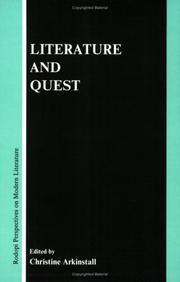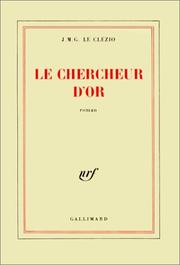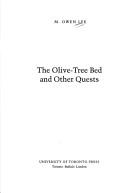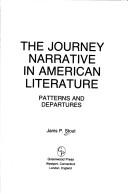| Listing 1 - 10 of 24 | << page >> |
Sort by
|

ISBN: 9004656456 9051835159 Year: 1993 Publisher: Amsterdam : BRILL,
Abstract | Keywords | Export | Availability | Bookmark
 Loading...
Loading...Choose an application
- Reference Manager
- EndNote
- RefWorks (Direct export to RefWorks)
What does the word "quest" conjure up? A journey in the hope of fulfillment, an exploration of identities, questions, the nature of research itself, or the darker side of quest in the form of conquest, colonisation and displacement? These are some of the threads taken up and developed in this collection of essays by established and emerging scholars. Germaine Greer, Italo Calvino, Umberto Eco, Serge Doubrovsky, A. S. Byatt, Novalis, Melville, Valéry, Beckett, Stanislao Nievo, Victor Segalen, Sibilla Aleramo, Dacia Maraini, Defoe, Tournier, Coetzee, Sor Juana Inés de la Cruz, Cintio Vitier, Domingo del Monte, Ramón de Palma, Pablo Armando Fernández, Hubert Aquin, Anne Hébert , Homer, Proust, Balzac and Robbe-Grillet provide the literary voices that invite these scholars to embark on their own quests into subjects as diverse as the relationships between texts, authors and readers, the initiatic journey, spirituality and enlightenment, female autobiography and identity, oppression, imperialism and postcolonial discourses, not to mention the history of the quest itself. The result is a rich tapestry of thought-provoking insights into the inexhaustible connections between literature and quest.
Book
ISBN: 9781552453797 1552453790 Year: 2019 Publisher: Toronto Coach House Books
Abstract | Keywords | Export | Availability | Bookmark
 Loading...
Loading...Choose an application
- Reference Manager
- EndNote
- RefWorks (Direct export to RefWorks)
Quests (Expeditions) --- Male friendship --- Ontario --- Botanists --- Travel
Book
ISBN: 1299426247 3035260982 Year: 2010 Publisher: Bruxelles ; New York : P.I.E. Peter Lang,
Abstract | Keywords | Export | Availability | Bookmark
 Loading...
Loading...Choose an application
- Reference Manager
- EndNote
- RefWorks (Direct export to RefWorks)
La thématique du crime, de l'enquête ou du suspect, en termes de vraies et de fausses pistes, suffit-elle encore pour faire avancer la recherche sur les frontières entre le roman policier et les autres formes du récit ? Cette question est au centre des réflexions de ce livre. Cet ouvrage explore les zones opaques de l'écriture romanesque et ses voiles identitaires et imaginaires. Il aide à mieux décrire la production de sens dans le roman par le biais des modèles issus de la linguistique, de la pragmatique, de la sémiologie, de la poétique et de la narratologie, qui ouvrent plusieurs perspectives sur l'aspect mystérieux du récit romanesque dont l'œil narratif accompagne le silence des personnages et engage le lecteur dans une vaste entreprise d'élucidation. Il exploite les ressorts épistémologiques et esthétiques d'un type de narration fondée sur le manque et l'inadaptation.
Quests (Expeditions) in literature. --- French literature --- History and criticism.

ISBN: 2070702472 9782070702473 2070380823 9782070380824 Year: 1991 Publisher: Paris: Gallimard,
Abstract | Keywords | Export | Availability | Bookmark
 Loading...
Loading...Choose an application
- Reference Manager
- EndNote
- RefWorks (Direct export to RefWorks)
Une autre ##Ile au trésor##. Très beau récit au charme exotique et au rythme incantatoire, par un romancier inspiré, poète-démiurge. Comme l'écrit avec talent, J. Folch-Ribas dans ##La Presse## du 20 avril 1985, l'essentiel de l'oeuvre est dans la symphonie sensuelle d'un enfant de l'île Maurice (océan Indien), au début du siècle, "qui se collète avec les rêves d'or de son père, la tendresse de sa mère, le plaisir du corps d'une femme et les magnifiques rêves d'aventures que lui procureront des marins hors du commun ... ". Splendide roman d'aventures nourri des plus anciennes mythologies du monde et de métaphysique.
France --- 840-3 LE CLEZIO, JEAN-MARIE GUSTAVE --- Désherbage --- Frans --- Deselectie --- Novela francesa --- Quests (Expeditions) --- Quests (Expeditions). --- Quête --- Treasure troves --- Treasure troves. --- Trésors --- Recherche --- Mauritius --- Mauritius. --- Île Maurice

ISBN: 9781442678064 1442678062 9780802041388 0802041388 0802079849 9780802079848 1282025503 9786612025501 Year: 1997 Publisher: Toronto
Abstract | Keywords | Export | Availability | Bookmark
 Loading...
Loading...Choose an application
- Reference Manager
- EndNote
- RefWorks (Direct export to RefWorks)
In The Olive-Tree Bed and Other Quests, the fourth in the series of Robson Lectures published by the University of Toronto Press, Father Lee studies the quest myth as it occurs in Homer's Odyssey, Virgil's Aeneid, Wagner's Parsifal and Goethe's Faust. Though the four works represent four different genres - oral epic, written epic, music drama, and poetic drama - each deals with the finding of an elusive goal attainable only by the hero called to find it. The questing for the olive-tree bed, the Golden Bough, the Holy Grail, and the Eternal Feminine is, at the deepest level, the hero's search to find the meaning in his life. Though Father Lee's lectures address critical problems in the four works, and draw to some extent on Jungian insights, this volume is also a personal memoir written in the belletristic style for which its author has become known. Father Lee wears his learning lightly, and his writing changes from chapter to chapter as it reflects, in turn, the clarity and naïve sense of wonder in Homer, the darkness and ambivalence in Virgil, the intuitive mysticism of Wagner, and the riotously imaginative exuberance of Goethe. Each of the four quests comes eventually to be seen as every person's search to discover himself - for the journey of the hero is the myth each of us is called to live.
Book
ISBN: 1283665999 1782040366 1843843285 Year: 2012 Publisher: Cambridge : D.S. Brewer,
Abstract | Keywords | Export | Availability | Bookmark
 Loading...
Loading...Choose an application
- Reference Manager
- EndNote
- RefWorks (Direct export to RefWorks)
"Offers the first full study of the allegorical knightly quest tradition from the Middle Ages to the Renaissance. Richly satisfying, as impressive in the detail of its scholarship as in the elegance of its critical formulations. It seamlessly moves between different literary traditions and across conventional period boundaries. In Dr Nievergelt's treatment of this theme, the successive retellings of the tale of the knight's quest come to stand as an emblem of shifting values and norms, both religious and worldly; and of our repeated failures to realise those ideals." Dr Alex Davis, Department of English, University of St Andrews. The literary motif of the "allegorical knightly quest" appears repeatedly in the literature of the late medieval/early modern period, notably in Spenser, but has hitherto been little examined. Here, in his examination of a number of sixteenth-century English allegorical-chivalric quest narratives, focussing on Spenser's 'Faerie Queene' but including important, lesser-known works such as Stephen Bateman's 'Travayled Pylgrime' and William Goodyear's 'Voyage of the Wandering Knight', the author argues that the tradition begins with the French writer Guillaume de Deguileville. His seminal 'Pèlerinage de la vie humaine' was composed c.1331-1355; it was widely adapted, translated, rewritten and printed over the next centuries. Dr Nievergelt goes on to demonstrate how this essentially "medieval" literary form could be adapted to articulate reflections on changing patterns of identity, society and religion during the early modern period; and how it becomes a vehicle of self-exploration and self-fashioning during a period of profound cultural crisis. Dr Marco Nievergelt is Lecturer (Maître Assitant) and SNF (Swiss National Science Foundation) Research Fellow in the English Department at the Université de Lausanne.
Quests (Expeditions) in literature. --- English literature --- Quests in literature --- History and criticism.
Book
ISBN: 8880631500 Year: 1998 Publisher: Ravenna Longo
Abstract | Keywords | Export | Availability | Bookmark
 Loading...
Loading...Choose an application
- Reference Manager
- EndNote
- RefWorks (Direct export to RefWorks)
Book
ISBN: 083830642X Year: 1973 Publisher: New York (N.Y.): Haskell
Abstract | Keywords | Export | Availability | Bookmark
 Loading...
Loading...Choose an application
- Reference Manager
- EndNote
- RefWorks (Direct export to RefWorks)
Arthurian romances --- Grail --- Knights and knighthood in literature --- Quests (Expeditions) in literature --- History and criticism --- Legends
Book
ISBN: 9780007445219 0007445210 Year: 2012 Publisher: London HarperCollins Publishers
Abstract | Keywords | Export | Availability | Bookmark
 Loading...
Loading...Choose an application
- Reference Manager
- EndNote
- RefWorks (Direct export to RefWorks)
In the great tradition of publishing famous children's books in Latin, professional classicist and lifelong Tolkien fan Mark Walker provides a deft translation of the entire book. His attention to detail, including the transformation of Tolkien's songs and verses into classical Latin metres, will fascinate and entertain readers of all ability, even those with only a minimal acquaintance with the language.
Middle Earth (Imaginary place) --- Quests (Expeditions) --- Hobbits (Fictitious characters) --- Good and evil --- Baggins, Bilbo

ISBN: 0313232350 Year: 1983 Publisher: Westport (Conn.): Greenwood
Abstract | Keywords | Export | Availability | Bookmark
 Loading...
Loading...Choose an application
- Reference Manager
- EndNote
- RefWorks (Direct export to RefWorks)
American literature --- Escape in literature --- Narration (Rhetoric) --- Quests (Expeditions) in literature --- Travel in literature --- History and criticism
| Listing 1 - 10 of 24 | << page >> |
Sort by
|

 Search
Search Feedback
Feedback About UniCat
About UniCat  Help
Help News
News